Uncharted Territory
Despite strong turnout at rallies, public education loses fight over vouchers
PLUS: Other education initiatives up in the air as session enters final stretch

ALSO INSIDE: What the WEP and GPO repeal could mean for you | TCTA



Despite strong turnout at rallies, public education loses fight over vouchers
PLUS: Other education initiatives up in the air as session enters final stretch

ALSO INSIDE: What the WEP and GPO repeal could mean for you | TCTA


I’m not generally a fan of reality TV, but the notable exception is “Survivor.” My family has been glued to the television on “Survivor Night” for 24 years (48 seasons, and yes, we’ve watched every single episode). Even as our children have grown and it’s just the two of us, my husband and I still sit down together on Wednesday nights to watch the physical challenges and ever-shifting alliances that keep us guessing from week to week. My oldest daughter and I message each other throughout with commentary about the players (several weeks ago, I accidentally texted “Oh no, Mitch!” to a very bewildered member of the TCTA lobby team).
If you’re not a fan of the show, you might at least have heard of its motto: Outwit, Outplay, Outlast. At some point over the last couple of decades I realized how applicable that tagline and other features of “Survivor” are to the Texas Legislature.
As I write this column, we have entered the chaotic phase of the legislative session. It happens every time. The collegiality of the first couple of months has dissolved, and members have begun to play hardball — sometimes to pass or kill legislation, but often to score political points. Sometimes it’s House vs. Senate, sometimes Republicans vs. Democrats, sometimes it’s warring factions within a chamber’s controlling party.
In April, as the voucher proposal (SB 2) came up for consideration on the House floor, it was clear to all involved that there were enough votes to pass the bill. Democrats, with an 88-62 minority, devised a strategy using their only leverage. They proposed an amendment that would have required a public vote on the voucher plan and vowed that if it were not included, they would withhold their votes to block passage of any upcoming constitutional amendment resolutions (which require 2/3 majority approval).
Around the same time, a group of hard-core conservatives objected to a memorial resolution honoring Cecile Richards, longtime president of Planned Parenthood and daughter of Gov. Ann Richards. The calendar of memorial and congratulatory resolutions is typically insulated from politics, with House members respecting each other’s efforts to honor their constituents. But the group killed the resolution, and went on to threaten another historically apolitical calendar reserved for local and uncontroversial bills. The group was unhappy that bills filed by Democrats were being considered before Republican priority bills had passed.
These types of strategies often fizzle.(For example, despite losing their amendment on the voucher bill, Democrats only blocked one bill in April before splitting ranks to vote in favor of other proposed constitutional amendments.) But sometimes they play out in dramatic ways. We saw a “Memorial Day Massacre” in 1997 when a vindictive legislator wiped out an entire day’s calendar with a point of order, killing 52 bills that were on the verge of making it through the legislative process. More recently was the “Mother’s Day Massacre” of 2017, when the House Freedom Caucus derailed more than 100 bills in retaliation for perceived unfairness in House procedures.
Education policy matters often get caught up in these strategic plays. Important bills can fall prey to broken alliances, unwise political moves, or the occasional (metaphorical) storm that comes through and wipes out everything in its path. In 2023, school funding and teacher pay raises were held hostage to the voucher bill, which the House blocked. This session, while we lost the voucher battle, there are still other bills in the pipeline that could positively impact teachers and students. TCTA has been very successful in improving dozens of bills that are working their way
Continued on page 23
Texas Classroom Teachers Association
PO Box 1489, Austin, TX 78767-1489
Office hours: 8 a.m. to 6 p.m., weekdays
Phone: 888-879-8282
Fax: 512-469-9527
Website: tcta.org
2024-25 Board of Directors
President
Melody Young, Sherman
President-Elect
Vivian Burleson, Northside
Immediate Past President
Nydia Alvarez-Alonzo, Mission
Budget
Thomas Evans, Abilene
Curriculum & Instruction
Cristal Isaacks, Levelland Governance
Jennifer Hutchinson, San Marcos
Legislation
Brec Espinoza, Brownwood
Membership
Debra Helbert, Lamar Consolidated Professional Rights & Responsibilities
Sharron Wood, Deweyville
Teacher Personal Services
Melanie Hoyt, Pottsboro
Staff Contacts
Executive Director
Ann Fickel
Attorneys
Michael Currie
Julie Leahy
Paige Williams
Kaylan Dixon Smith
Derrell Coleman
Business Office
Park Brigtsen
Communications
M. Clare Haefner
Legislation
Paige Williams
Pamela McPeters
Quinn McCall
Kaylan Dixon Smith
Ann Fickel
Membership
Persie Tynes
Services Corporation
Jan Lanfear
Contract Attorney
Lindsay Gustafson
Senior Policy Consultant
Holly Eaton
About TCTA
The Texas Classroom Teachers Association is an independent association for Texas teaching professionals that was founded in 1927. TCTA is based in Austin and is the only statewide teachers association that limits active-level membership to those directly involved in classroom teaching or teaching support.

School vouchers cross finish line, other education initiatives pending Mid-session is a time for legislators and lobbyists alike to take stock of their progress at the Capitol and craft plans for the end of the session, which ends June 2. As legislators hope to shepherd some of their bills through the last steps of the process, TCTA remains active in helping provide a final polish for significant education bills as they are scheduled for floor debate in both the Texas House and Senate.
With the repeal of the WEP and GPO, educators may now feel motivated to take action to maximize their Social Security benefits. Our Q&A helps you get that process started.
The Trump administration’s efforts to cut Education Department staffing, reduce civil rights investigations and stall the flow of federal funding will impact K-12 public schools.
Meet five TCTA members honored as 2025 Regional Elementary Teachers of the Year and learn more about what inspires and motivates them to stay in the classroom.
Delegates elected new statewide leaders for TCTA, visited the Capitol and earned CPE hours that all members can now watch on demand in our online collection.
Publication schedule is quarterly. Annual membership dues for TCTA are $175, $5 of which is allocated to a one-year subscription to THE CLASSROOM TEACHER. Subscriptions for nonmembers are available for $10 per year. POSTMASTER: Please send changes of address, articles and/or photographs to: Editor, THE CLASSROOM TEACHER, PO Box 1489, Austin, Texas 78767-1489. TCTA is located at 700 Guadalupe, Austin, Texas 78701. PERIODICALS POSTAGE PAID AT AUSTIN, TEXAS.
The State Board for Educator Certification met Feb. 14 to approve a number of rule changes regarding teacher certification, including changes to how educator preparation programs prepare teachers.
With the 2023 passage of House Bill 1605, a lengthy bill focused on the creation of a state-curated list of high-quality instructional materials (HQIM), educator preparation programs (EPPs) were charged with preparing teacher candidates to effectively use those materials.
SBEC oversees the standards that EPPs use to prepare teachers and has worked to implement new standards to include references to HQIM. Early drafts of the rule required EPPs to prioritize HQIM, but TCTA and other stakeholders worked with the Texas Education Agency and SBEC to change that to emphasize so as not to imply that using HQIM is mandatory.
During its February meeting, SBEC also debated changes to rules that govern the standards under which educators are sanctioned for misconduct, including contract abandonment.
TCTA has worked closely with TEA staff throughout the rulemaking process and successfully advocated for changes in the language to the proposed rules, so that the final language
TCTA’s eUpdate newsletter received a Gold Star for the third consecutive year at the Texas School Public Relations Association’s annual Star Awards, which were held Feb. 19 during TSPRA’s annual convention in San Antonio.

TCTA’s 2024 convention postcard, praised for its Texas travel theme, and 2023 holiday card also received Gold Stars.
The Classroom Teacher magazine received a Silver Star.
The awards program recognizes the outstanding education communications and projects of TSPRA members. TCTA competes against other associations and school districts serving more than 40,000 students. Independent, impartial judges evaluate each work and project based on set criteria.
considered Feb. 14 largely addressed the concerns TCTA initially raised. However, one remaining issue relates to the sanctions imposed by SBEC for contract abandonment. SBEC maintains a list of criteria that are considered good cause for abandoning a contract, precluding a sanction from being issued, as well as criteria that are considered to be mitigating factors to any sanction SBEC might issue. It is possible to avoid a sanction if the judge and TEA staff determine that enough mitigating factors are present.
The proposed rule change would streamline how much each factor mitigates the sanction; previously, it was up to the judge to determine how much each factor would affect it, but new rules would make each factor a one-month reduction.
TCTA expressed concern in written comments ahead of February’s meeting that the rule as proposed conflicts with existing law that requires SBEC to consider a full range of sanctions prior to imposing a sanction for contract abandonment. After considering that feedback, SBEC members modified the proposed language to allow more flexibility in imposing sanctions when certain mitigating factors are present.
After some discussion, SBEC approved these rule changes, sending them to the State Board of Education for review and final approval.
TCTA was honored Feb. 25 by the League of Women Voters of Texas during its annual Making Democracy Work dinner in Austin. TCTA Executive Director Ann Fickel accepted the award, which commended TCTA for “strengthening Texas’ democracy through voter education, advocating for public education and providing legal support” to our members.
Did you know school email accounts are often monitored by districts? If we only have your school email address and our legal department sends you any written communications about an issue they’re helping you with, those exchanges may not be confidential. Also, using school emails (or devices) to contact lawmakers may violate district policies.
Make sure you receive important TCTA news, like our eUpdate newsletter, action alerts and membership renewal reminders by sharing a personal email address with us. That way, if you change districts, you ensure we can still reach you. Log in at members.tcta.org or call us to update your account.
For more than a year, the State Board for Educator Certification has worked to update a framework through which special education teachers who teach grade-level content can demonstrate their competency without having to obtain additional certification. The previous framework, called HOUSSE, allowed those teachers to credit years of experience, professional development, college credit hours and more toward their HOUSSE worksheet. With enough credit, they would be considered competent to teach that subject.
The Texas Education Agency initiated a process to replace HOUSSE with a new framework to demonstrate content competency. The initial proposal would have eliminated flexibility offered by HOUSSE and required special education teachers to obtain standard certification in any core subject taught. TCTA moved quickly to warn TEA and SBEC of the potentially disastrous consequences of suddenly requiring special education teachers to obtain additional certification, especially considering the shortage of special education teachers in Texas.
Over the past few years, TCTA has worked closely with TEA
and testified before SBEC to develop a new framework that maintains the flexibility of HOUSSE and adds more options for special education teachers to demonstrate content competency. SBEC approved the new framework in February and sent it to the State Board of Education for approval.
SBOE considered the new framework in one of its April committee meetings, but on a party line vote, the committee recommended that the full board veto the item over its inclusion of the National Board Certified Teacher designation as a route to demonstrating content competency.
Many Republicans in the Texas Legislature and a handful on the SBOE take issue with the National Board Certification program. There have been similar efforts to remove NBCT as a route to obtaining a Teacher Incentive Allotment designation in the legislature this session.
TCTA worked to convince key members to support the plan before the full Board voted April 11. With those members’ support, SBOE approved the framework as recommended by SBEC. The new framework will be effective Sept. 1, 2025.
Three TCTA members are among the state finalists for the 2025 H-E-B Excellence in Education Awards:
• Valerie Paredes of Harlingen Collegiate High School in Harlingen ISD is a finalist in the School Counselor Secondary category.
• Ashley Wright of Annette Gordon-Reed Elementary in Conroe ISD is a finalist in the School Counselor Elementary category.
• Carol Fernandez of Maria Hernandez Elementary School in San Marcos CISD is a finalist in the Lifetime Achievement Elementary category.
Nominations for the 2026 H-E-B Excellence in Education Awards are now open to all state-certified public school professionals currently working in Texas. Teachers, counselors, principals, early childhood centers, school boards and districts can win cash prizes for their outstanding work. Nominations will close on Sept. 30. Apply at heblovesteachers.com.



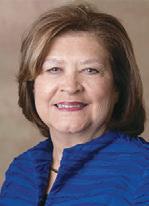
The TRS Board of Trustees honored former trustee Nanette Sissney during its April meeting, approving a resolution honoring her 17 years of service. Sissney, a longtime TCTA member from Whitesboro ISD and former TCTA state president, is the TRS Board’s longest serving vice chair in the 21st century. Sissney held the post from October 2009 to April 2016 and from November 2017 to January 2025.
“Being a public educator for 32 years and serving on the TRS Board has been a tremendous experience,” Sissney said. “It was apparent when I attended my very first meeting that this board existed to serve its members. Retirement security for its 2-plus million members is an awesome responsibility and it will continue to be the driving force for this body. It is our mission — period. … Serving has been an honor and privilege.”


Many members tell us they joined TCTA because a colleague asked them to join. Campus faculty representatives help us reach potential members and encourage them to get the professional liability insurance coverage and attorney access that’s so important for anyone in the classroom.
If you’re already a campus FR, thank you for all you do to support TCTA. We hope you’ll continue to serve in this capacity during the 2025-26 school year. If you’ve been thinking about getting more involved with TCTA, becoming a campus faculty representative is a great place to start.
What’s involved: Faculty representatives receive a kit each summer with a poster, membership brochures, pens, pencils and other materials to share with colleagues on campus when the new school year begins. We ask each FR to reach out to colleagues during your first week or two back on campus to encourage them to join TCTA. You can learn more about being a faculty representative at tcta.org/membership/ get-involved.

Does it work?: TCTA’s largest local affiliate, Lamar CTA,
holds that distinction for a reason. Local officers work to ensure every campus in Lamar CISD has a TCTA faculty representative to serve as a point of contact for recruitment efforts and to help keep TCTA informed of concerns in the district. Last year, each FR was given a goal of recruiting two new members from their campus, which helped Lamar CTA add 98 new members in the 2024-25 school year.
Get Take 2/Make $25 credit: Through our recruitment incentive program, you’ll earn $25 for every two eligible First-Time Active members who include your member number or name on their application.
Sign up now! If you’d like to be a faculty representative on your campus in the 2025-26 school year, scan the QR code to fill out our FR form and make plans to join us at a summer training workshop in July to learn more about how to be a great FR. Current faculty representatives can fill out this form as well to make sure we have your current campus information and preferred mailing address before we mail materials in July.
Questions? Contact Persie Tynes, TCTA’s director of membership, at membership@tcta.org or call 888-879-8282.
Monday, July 14
San Antonio | District 20
Tuesday, July 15
Houston | District 4
Wednesday, July 16
Beaumont | District 5
Belton | Districts 12 & 13
Thursday, July 17
Virtual session on Zoom
Friday, July 18
Weslaco | District 1
Tuesday, July 22
Amarillo | District 16
Wednesday, July 23
Lubbock | District 17
Thursday, July 24
Sherman or Denison Districts 10 & 11
Friday, July 25
Tyler | District 7
Members are welcome at any workshop but must cover
Many districts are experiencing budget shortfalls this year and some have made the difficult decision to eliminate staff to reduce costs. When this occurs, many educators are unsure of what their rights are and what protections they might have. The answers often depend on the kind of contract the educator has and the specific steps the district has taken to address its budget shortfall.
A reduction in force, or RIF, is an action that a school board can take to eliminate professional contract personnel when the school district is facing a financial emergency or plans to implement a program change. A school district may nonrenew a teacher’s contract at the end of its term or may terminate a contract during its term as the result of a properly implemented RIF. There are strict legal requirements that govern the RIF process and determine which teachers, if any, are subject to contract nonrenewal or termination.
A school district that prefers to avoid the formal procedures associated with a RIF of contract employees may choose to terminate the employment of uncertified teachers or at-will employees as an alternative.
To initiate the RIF process for contract employees, a school district’s board of trustees must either declare a financial exigency or a program change. A declaration of financial exigency means that the district as a whole faces a budgetary emergency, while a program change is typically a more targeted restructuring that might be used by a district as a cost-saving measure, such as elimination of a curriculum offering. From an employment perspective, financial exigency could impact all professional contract employees in the district, while a program change should only affect those educators assigned to work in the identified program.
Once the district has declared a

reduction in force, it must identify the employment area affected by the RIF, such as a campus, grade or program, and apply its local board policies to identify the teachers who will be affected. Only teachers assigned to work in the employment areas defined by the board of trustees are at risk of being subject to the RIF.
Although the criteria can vary, most districts’ policies utilize some combination of certification, performance, seniority and professional background to determine which teachers within the specified employment area are subject to the RIF. Once the teachers are identified, their names are submitted to the school board, which must then vote to propose the nonrenewal or termination of the contracts and must give those teachers notice of the action and an opportunity for a hearing as required by law.
A school district does not need to implement a RIF to terminate the employment of an employee with a probationary contract at the end of its term, an uncertified teacher or an at-will employee. A school district may choose to terminate a probationary contract at
the end of the school year for any reason that is in the best interests of the district. However, if the school district attempts to terminate the contract of a probationary contract teacher during the school year, the district must observe the RIF process and must provide the teacher with an opportunity for notice and a hearing in accordance with law.
With respect to uncertified teachers, a teacher’s contract is voidable if the teacher does not hold any certification issued by the State Board for Educator Certification or fails to renew a permit (note that this provision does not apply to teachers who hold certification but are assigned to teach outside of their area of certification). This means that, at any time and for any reason, a school board may declare that an uncertified teacher’s contract is void. After it has done so, the board may terminate the teacher’s employment.
The employment of at-will employees may be terminated at any time, for any lawful reason.
Probationary contract holders being terminated at the end of the contract term, uncertified teachers and at-will employees may file a grievance in accordance with board policy regarding their termination from the school district.
Continued on page 22
In the final hour of the 118th Congress, the U.S. Congress made history with the passage of H.R. 82, the Social Security Fairness Act, repealing the Windfall Elimination Provision (WEP) and the Government Pension Offset (GPO). President Joe Biden signed H.R. 82 into law on Jan. 5. These two federal provisions had limited Social Security benefits for millions of public servants across the U.S. Their elimination restores/ increases benefits to Texas teachers who, up to now, have been penalized for working in a school district that does not participate in Social Security and receiving a pension through TRS.
Affected public employee retirees are expected to receive an average of $360 per month due to H.R. 82. Payments will be retroactive to January 2024. Since passage of the bill, many TCTA members have been asking how the change will impact them. We are answering some of your most-asked questions about how the repeal could affect you in addition to providing a better understanding of the Social Security system in general.
Retired educators with a TRS pension who also are entitled to Social Security benefits through their own participation in TRS or through their spouse will benefit. The Congressional Budget Office estimated more than 273,000 Texans are impacted by the repeals: 57,455 had been penalized by the GPO, 169,678 by the WEP and 46,021 by both. Most eligible retired Texas teachers have received a retroactive check (for benefits dating to January 2024) in addition to their first full monthly benefit. If you are retired or retiring soon, be sure to apply for your benefits through the Social Security Administration and/or make sure your information is current in their system.
With the repeal of the WEP in particular, you may now feel motivated to take action to maximize your Social Security benefits. You will want to work for an employer that pays into the Social
Security system as many years as possible and earn as much as possible. Benefits are based on your highest years of reported earnings (i.e., earnings in jobs in which you paid into Social Security) up to 35 years. Additionally, to earn the highest monthly check you will want to wait until full retirement age (FRA) or later, up to age 70, especially if you expect to live a long time; each year beyond your FRA results in an 8% increase in your benefit. On the other hand, some financial advisers recommend taking benefits as soon as possible (generally age 62), as the additional years receiving payments may offset the significantly reduced amount. Strategically planning around these factors is crucial.
When it comes to Social Security there are other considerations as well. You should monitor your earnings statement for accuracy and ensure your earnings are reported correctly. You also should be aware of potential tax implications as Social Security benefits are subject to federal income tax (more information is included below). By carefully considering these factors and seeking professional advice if needed, you can maximize your Social Security benefits and ensure a more comfortable retirement.
What is the effective date of the Social Security Fairness Act?
The Social Security Fairness Act went
The WEP, which took effect in 1983, reduced Social Security benefits received by retirees who also receive a pension based on work not covered by Social Security (such as your TRS pension). Ninety-six percent of Texas public school employees do not pay into Social Security through their work with Texas schools. However, many have other jobs before, during, or after their employment in education in which they do pay into the federal program. Those earned benefits were reduced by the WEP, surprising many retirees who expected to receive their full Social Security benefits as part of their retirement income.
The GPO reduced government employees’ spousal or survivor benefits. A person meeting specific criteria can receive a benefit equaling up to half of their spouse’s (or ex-spouse’s) Social Security benefit, or up to 100% of the benefit after the death of a spouse. The GPO reduced the spousal benefit by two-thirds the amount of their TRS annuity. In many cases, this completely eliminated the spousal Social Security benefit Texas public education retirees expected. Passage of the Social Security Fairness Act eliminated these provisions and you will be able to receive the full benefits you have earned.
into effect Jan. 5, 2025, and the new law restores benefits retroactive to January 2024.

What do I need to do now that the Social Security Fairness Act has passed?
If you were affected by the WEP and/or GPO, but have not yet received increased benefits to which you are entitled, first, be sure to verify that the mailing address and/or direct deposit information that SSA has on file is accurate and up to date:
• Check your person Social Security Account. Visit www.ssa.gov/my account to sign in or create an account.
• If you are unable to create an account, call 1-800-772-1213 to verify the information SSA has on file.
If you are eligible to receive benefits but have not applied, or are not sure whether you have applied:
• The most convenient way to apply for retirement or spouse’s benefits is online at www.ssa.gov/apply
• The SSA can take an application by phone for people who did not previously apply for retirement benefits because of the WEP or GPO.
• You may have heard earlier this spring that Social Security would no longer provide phone services and assistance would only be available through in-person appointments. That proposed policy was rescinded and phone support continues to be available.
Surviving Spouse’s Benefits:
• The survivor benefit application is not available online.
• Call 1-800-772-1213 Monday through Friday, from 8 a.m. to 5 p.m. Central time.
• You may need to file an application. The date of your application might affect when your benefits begin and your benefit amount. However, each case is different, and all other Social Security laws and policies, such as benefit reductions for claiming benefits before the full retirement age, the retirement earnings test, and others, still apply.
For additional eligibility information, visit www.ssa.gov/apply.
During the week of Feb. 24, 2025, SSA began paying retroactive benefits and has increased monthly benefit payments to most people whose benefits have been affected by the WEP and GPO.
The retroactive benefit, covering the amounts owed to those affected dating back to January 2024, will be a onetime payment, deposited into the bank account SSA has on file.
Social Security benefits are paid one month behind. Most affected beneficiaries should have begun receiving their new monthly benefit amount in April 2025 (for their March 2025 benefit).
Anyone whose monthly benefit is adjusted, or who will get a retroactive payment, will receive a mailed notice from Social Security explaining the benefit change or retroactive payment.
If you believe you are due a retroactive payment and/or a new monthly benefit amount and did not receive them, contact the SSA to inquire about
Continued on page 21

OnMarch 20, President Donald Trump issued a long-awaited executive order to “close” the U.S. Department of Education. The order, entitled Improving Education Outcomes by Empowering Parents, States and Communities, is broadly written and gives Education Secretary Linda McMahon the authority to facilitate “under the maximum extent appropriate and permitted by law,” the return of education policies to states.
While the order seeks to ensure the “effective and uninterrupted delivery of services, programs and benefits” it also instructs that the distribution of agency funds should comply with the Trump administration’s policies — specifically, the exclusion of diversity, equity and inclusion (DEI) awards and programs promoting gender ideology. The plan to close the Education Department was part of the GOP campaign platform and a potential road map for dismantling the department was presented in Project 2025, a policy agenda developed by the Heritage Foundation and designed to guide a second Trump presidency.
Dismantling the department in its entirety will require an act of Congress (since Congress created the department in 1979), but changes have been initiated by undertaking a reduction in force, conducting investigations and stalling the flow of federal funding.
These efforts will impact K-12 schools and students as state education agencies could assume a larger role in setting education policy around program funds, specifically for Title I and the Individuals with Disabilities Education Act (IDEA). There is the possibility that the administration will send funds to states as block grants, with murky guidance on how the funds are spent.
President Trump has stated that Title I funding will be preserved with
funding distribution authority potentially shifted to the Department of Health and Human Services’ Administration for Children and Families. However, that agency is also undergoing structural reorganization and has seen a significant reduction in staff. Shifting programs to another agency can result in a loss of specialized administration and management of the programs.
As mentioned, returning authority to the states leaves the interpretation of where funding should be allocated to the states and removes necessary federal oversight. Stakeholder groups fear the lack of federal guidance can leave some students vulnerable, especially those with disabilities, those from low-income families, rural students and English learners. Opponents also are concerned that states would not maintain fidelity to federal laws, like the Family Educational Rights and Privacy Act. But some states welcome the ability to have more control over federal dollars.
In addition to a departmental reorganization, there are other legislative actions that could impact K-12 education this year. Congressional Republicans are eying a budget reconciliation process and rescission measures to advance President Trump’s agenda. While reconciliation is focused on the extension of tax cuts and
policies related to immigration, border security, energy and defense, lawmakers must find savings through cuts to other programs to pay for these budget increases.
Reconciliation bills can only be used for changes in mandatory spending (anything that does not need to be agreed upon by Congress each year to continue). Mandatory spending includes Medicare, Social Security, some parts of government food programs, and servicing the federal debt and taxes. It does not affect annually appropriated discretionary programs like 21st Century Community Learning Center, Title I or Community Schools.
This means that discretionary K-12 programs like Title I — aimed at disadvantaged students — and the Individuals with Disabilities Education Act probably won’t be included in reconciliation. The House Education and Workforce Committee will be charged with finding savings, which could come from the elimination of interest exclusion on state and local bonds, often used for school improvements, and reforming the Public Service Loan Forgiveness program by limiting eligibility for public servants like teachers to have their loans discharged after 10 years of service. Other changes to student loan programs are also on the table, as is an elimination of an exclusion of scholarship income from taxation and the tax deduction of interest on student loans.
The Trump administration has taken numerous and contested actions to prevent appropriated funds from being spent by agencies across the board. While these actions are being litigated in federal courts, there is a process whereby Continued on page 22
JoMeka Gray decided to become a teacher while her husband was deployed to Iraq with the U.S. Army.
“Since he was doing his part to protect our country, I decided to also make a difference by becoming a teacher to other families in our military community who had loved ones deployed,” she said.
Over the past 12 years in public schools, the kindergarten teacher in Temple ISD continues to teach students connected to the military in her Central Texas community near Fort Cavazos. She’s also taught first grade, worked in pre-K3 at a daycare and been a Little League coach.
Gray serves as a Teach Plus senior advocate for Texas and is a mentor teacher. She also is a member of the National Board of Professionals Standards’ Contemporary Relevance team. Earning National Board certification in general early childhood education helped Gray become the 2025 Region 12 Elementary Teacher of the Year and a finalist for the statewide title.
The recognition is appreciated, but Gray teaches because it gives her a chance to guide children to their full potential. Helping them succeed also helps her.
“It reaffirms my decision 12 years ago when I celebrate students who are progressing to their goals whether it is counting, writing, or even making a new friend,” she said. “Having the opportunity to build relationships with them, their families, and all stakeholders is truly remarkable for the outcome of our future professionals and innovators.”
Gray chose alternative certification and said it took her two years to get a classroom job in Texas. “Due to the amount of perseverance it took for me to be a classroom teacher, I always remain motivated,” she said. “I am appreciative of my former teachers who ignited a passion to learn within, and therefore always advocate for our students and colleagues to protect education during challenging times.”
She hopes others follow in her footsteps to help prepare future leaders.
“As teachers, we get the privilege to guide our young citizens and collaborate with other teachers/leaders in our community. It is impactful to guide learners along their journey in less than a year and to use your superpower to connect with your students.”

“I am so proud not only to represent teachers in my surrounding districts, but to be among these communities. It makes me thankful for the work I have done to advocate for student outcomes, mentor future teachers, and be a voice for teachers/families. The amount of support I have received from our region’s administrators, community and legislators has made me proud to be an inspiration for others.”
2025 Region 12 Elementary Teacher of the Year and statewide finalist
Current job: Kindergarten teacher, Kennedy-Powell Elementary School, Temple ISD
TCTA member since 2012
Education: Bachelor of Arts in Liberal Arts, Louisiana Tech
Certifications held: EC-6, English as a Second Language, National Board-certified in General Early Childhood
Nine TCTA members were among the 40 Regional Teachers of the Year for 2025 honored in October through the annual program administered by the Texas Association of School Administrators. Five elementary educators — Brianne Castillo, Diana Smith, JoMeka Gray, Morgan Combs and Kevin Criss — are featured in this issue. Region 14 Elementary Teacher of the Year Megan Jimenez declined to be featured. Three secondary teachers — Erick Morin, Jessica Brink and Deb Pritchard — were featured in the Winter 2024-25 issue of The Classroom Teacher. You can read their profiles at https://tinyurl.com/3krxeums
Many teachers say they have a lifelong love of school, knowing from an early age that they wanted to be educators. Kevin Criss has a different story.
The 2025 Region 20 Elementary Teacher of the Year and finalist for the statewide title says he’s only a teacher because his older sister forced him to go to college.
Home-schooled, his sister gave him a schedule for classes at Northeast Lakeview College when he graduated from high school. “Like it or not, I was enrolled,” he said. “During my second semester, I took a physical education class, and by the end of day one, I felt drawn to be a PE teacher.”
It was a huge awakening for a young man who never really liked or played sports. And it influenced the kind of educator he aims to be for the students at Cambridge Elementary School in Alamo Heights ISD — a PE teacher for all students.
“Whether they had never played sports, like myself, or if they were the star athlete, I believe every child can become physically educated and grow in self-confidence,” he said.
Criss, now in his 12th year of teaching, loves working with his students. “I have the privilege of working with over 800 students each school year,” he said. “I get to learn 800-plus personalities, senses of humor, reasons why they love physical education or reasons why they haven’t learned to enjoy it yet.”
He looks forward to being part of his students’ day and having a positive impact on their lives. “I absolutely love watching them have those moments of success where things click. I love helping them work their way through the emotions that come when you experience losing for the first or the hundredth time.”
He attributes much of his success to his coworkers, especially his wife, Christi, who teaches fifth grade at Cambridge Elementary. “They are some of the best people I have ever come to know, and I truly would not be the person I am without them,” he said. Criss added that his campus and district leaders help him feel supported and keep him motivated in challenging times. “They lead with love and a servant’s heart, they anchor in the reality of our times and prepare/respond accordingly, but hold steadfast to hope.”
Criss strives to do his part by showing students love and providing a safe environment for them to learn and grow.
“This profession is an act of love and servitude, there is absolutely nothing like it. It is not for the faint of heart or those who do not love others like themselves. Your future students deserve the best you have, so you need to take care of yourself first, so you can be your best,” Criss said. “While this job comes with a million and one challenges, it also can be one of the greatest parts of your life. The rewards for

KEVIN CRISS
“This whole experience has been a roller coaster of emotions. I am so incredibly humbled and honored to have received these awards, recognition and opportunities. I have the best job in the world, with some of the best people out there. The people I walk with, serve and love throughout my life have had a tremendous impact on me and now are being represented through me, and I am overjoyed to stand for them.”
2025 Region 20 Elementary Teacher of the Year and statewide finalist
Current job: Physical education teacher, Cambridge Elementary School, Alamo Heights ISD TCTA member since 2022
Education: Bachelor’s degree, University of Texas at San Antonio
Certifications held: EC-12 Physical Education, EC-6 core subjects, National Board-certified in Physical EducationEarly Adulthood through Young Adolescence
investing in this career are constantly multiplied and you can find joy in it, even if you have to choose to find it some days. I am truly honored to do my part for future generations.”
Brianne Castillo always dreamed of becoming a teacher.
“In kindergarten, I’d line up my Barbies, hand out ‘worksheets’ and teach lessons,” she said.
Many positive experiences in school reinforced that dream.
“It was in fourth grade, with the inspiring Mrs. Davila, that my dream solidified,” Castillo said. “She made me feel empowered, like I could conquer the world, like I could achieve anything. That’s the magic that I knew I wanted to instill in the world. That’s the magic that I now strive to pass on to every student who walks into my classroom, because learning is the greatest superpower we can give to our kids.”
Castillo’s superpower led to her selection as the 2025 Region 1 Elementary Teacher of the Year after only eight years in the classroom. She started her career in Corpus Christi ISD and is now a first grade teacher at Sullivan Environmental Science Academy in San Benito CISD. She’s also the spelling bee coach and part of the campus instructional leadership team. The honor was a humbling moment recognizing her hard work, perseverance and dedication to her craft. It also was a testament to the endless efforts of thousands of educators working toward a common goal: the success of students.
“It validated the countless hours spent planning engaging lessons, supporting diverse students, and fostering a positive and inclusive learning environment, but it also deepened my appreciation for the profession and the people who make it all possible,” she said.
Castillo’s favorite thing about teaching is the meaningful relationships she builds with students. “There’s something truly special about seeing them walk into the classroom at the start of the year and leave at the end transformed — more knowledgeable, more mature, and ready to take on the world,” she said. “I cherish those ‘light bulb’ moments when they overcome challenges, and I am constantly inspired by the growth they show.”
Watching her students grow keeps Castillo motivated. “Everything I do is for them. They are my motivation, my inspiration, and the reason I show up every day, even when it’s hard. There’s nothing more powerful than walking into a classroom full of kids who are genuinely happy to see you, who love you just as you are. I could be having one of the worst days imaginable, and a single hug from one of them is enough to turn it around. … They are a constant reminder that there is always a rainbow at the end of a storm.”
Castillo calls teaching one of the most challenging professions because it is filled with endless responsibilities.
“There will be days when you question your decision, when the work feels overwhelming, and the progress seems slow. But the reward at the end far outweighs the struggles along the way,” she said. “Teaching is the most fulfilling job, not because of the money, but because of the impact you make.

“Through this experience, I came to learn that such an achievement is not just a reflection of individual success, but of a collective community. My accomplishment was built on the collaboration with my colleagues, the support from my administrators, and the trust of the families in my classroom. This recognition reminded me that education is a shared among stakeholders with a similar mission that requires dedication, resilience and teamwork.”
Current job: First grade teacher, Sullivan Environmental Science Academy, San Benito CISD
TCTA member since 2016
Education: Bachelor’s degree in Interdisciplinary Studies, Texas A&M University–Corpus Christi; Master of Education in Administration, Lamar University
Certifications held: EC-6, Texas Association for Environmental Education certification
The relationships you build, the growth you witness in your students, and the success stories you become a part of; these are the true rewards. Mistakes will happen, and that is OK. We learn and grow alongside our students.”
Diana Smith began her professional career as a restaurant general manager. But seeing the challenges faced by others in the workplace inspired her to change direction.
“I was reminded of the profound impact teachers had on my life, which fueled a meaningful mission that I could not pass up. I decided to pursue an education degree to change the lives of individuals,” Smith said. “My goal was to inspire and shape the future of our communities and to strengthen our nation. I wanted to show others how to believe in themselves and to inspire them to love learning.”
For the past 21 years, she’s been doing that in classrooms in Kentucky, Indiana and Texas.
“At the heart of my educational work, I wanted to build intentional, meaningful relationships with my students, nurturing their potential and igniting their love and passion for learning,” Smith said. “I wanted the opportunity to create safe spaces where they could explore, question, take risks and grow. I believe these connections are the foundation upon which all purposeful learning is built.”
Smith is the 2025 Region 7 Elementary Teacher of the Year, recognized for her desire to cultivate a growth mindset in classrooms, empower students to embrace challenges and persist through setbacks. As a gifted and talented teacher in Edgewood ISD, she works with students in pre-K through fifth grade. She also serves as a reading language arts instructional coach and a STEM facilitator, and coaches a competition VEX IQ robotics team.
“As an educator, I knew I could renew passion and purpose by inspiring and leading with love. I wanted to create authentic connections to truly make a difference,” she said.
Smith loves the opportunity to shape lives, inspire students and help them discover their potential.
“Witnessing those ‘aha’ moments — when a student truly grasps a concept or finds their passion — is incredibly rewarding to both my students and me,” she said. “I also love the relationships I build with my students, colleagues, and the community. Teaching is more than just delivering lessons; it’s about making a lasting impact and being part of someone’s growth journey.”
She also believes in the transformative power of education and that belief, along with the support of her colleagues, keeps Smith motivated during challenging times.
Smith encourages new educators to “embrace the journey with an open heart and a growth mindset.”
She says, “This profession is as challenging as it is rewarding, but the impact you’ll have on young lives is unmatched and unlimited. Build strong relationships with your students and colleagues, and never stop learning.

DIANA SMITH
“Being the Region 7 Teacher of the Year is both an honor and a responsibility. It validates the hard work, dedication and love I pour into my students and my professional craft. It’s also an opportunity to amplify the voices of educators, advocate for positive change and share the best practices that have helped me succeed. Most importantly, it inspires me to continue striving for excellence and reminds me that my work as an educator has rippling effects far beyond the classroom.”
Current job: Grades K-5 gifted and talented teacher, Edgewood ISD; STEM facilitator for students in pre-K-5; district RLA instructional coach and competition VEX IQ robotics coach
TCTA member since 2013
Education: Bachelor of Science in Elementary Education, Indiana University; Master of Science in Elementary Education with emphasis in mathematics and reading language arts, Walden University
Certifications held: EC-6, English as a Second Language
Remember to celebrate small wins, practice self-care, and stay connected to your ‘why’ — the reason you chose this path.”
As a student, Morgan Combs loved school.
“I loved being at school, playing school and being around kids,” she said. “I vividly remember when I was in Mrs. Schreier’s third grade class, the ‘shoe fairy’ visited to bring a friend some new shoes. My friend was overjoyed, and so were my classmates and I. No one was upset that they didn’t get a pair, and my friend wasn’t disappointed because the shoes weren’t the most popular brand. He was happy, and we were happy for him.”
That experience helped inspire Combs’ career path.
“That moment taught me that teaching is impactful, farreaching and full of lessons that extend beyond academics,” she said. “I’ve always wanted to do something meaningful, and being a teacher allows me to make a difference every single day.”
Combs loves that teaching gives her an opportunity to help build students’ self-confidence.
“My goal as an educator is to help every student succeed, knowing that success looks different for everyone. It’s important to me that students feel confident in their abilities and proud of themselves. I love celebrating even the tiniest victories, building students up, and reminding them that they are loved, cared for and important,” she said.
That passion led to Combs’ selection as the 2025 Region 17 Elementary Teacher of the Year. It also inspired a shift from the classroom after 10 years as a teacher to working as a school counselor.
“During my last semester of undergraduate studies, I wrote a letter to myself that I still have and read at the beginning of every year and on days when I feel defeated. … One line I wrote continues to resonate with me: ‘God will put you exactly where He needs you to be.’ Remembering this truth and the positive impact I have on students keeps me grounded. It reminds me of the responsibility I carry in my role as an educator.”
Combs believes that education is one of the most rewarding and impactful professions.
“There will be days when you doubt yourself, your abilities, and the difference you’re making, but trust me — you ARE making a difference. Be an advocate for kids, and always remember that they are the most important part of any classroom.”

MORGAN COMBS
“Being named Region 17 Elementary Teacher of the Year is a humbling honor. I feel unworthy of an award of this magnitude, especially when I’m surrounded by so many amazing teachers on my campus, in our district and throughout our region — teachers who exemplify what it means to be champions for kids. To be recognized for my hard work, dedication and love for students is truly beyond words.”
2025 Region 17 Elementary Teacher of the Year
Current job: School counselor, South Elementary School, Levelland ISD
TCTA member since 2013
Education: Bachelor’s degree in Multidisciplinary Studies, Texas Tech University; Master of Science in Professional School Counseling, Angelo State University
Certifications held: EC-6, English as a Second Language, school counselor
Share your success with us! Were you chosen as your campus Teacher of the Year? Did you win an award or receive grant funding? Email communications@tcta.org and tell us about your recognition so we can share it in The Classroom Teacher
State President Melody Young of Sherman presided over the Representative Assembly as members gathered in Austin for TCTA’s 2025 Convention and Capitol Visit.
On Jan. 31, delegates and guests visited with lawmakers at the Capitol to share TCTA’s legislative priorities for the 2025 session, which the RA approved on Feb. 1.
During the Representative Assembly and District Coordinating Council meetings, delegates elected statewide leaders to TCTA’s Board of Directors and Advisory Council. The following people were elected or re-elected:
President-Elect: Cristal Isaacks, Levelland
Governance Director: Sharron Wood, Deweyville Legislation Director: Brec Espinoza, Brownwood (reelected)
Membership Director: Velma Sanchez, PSJA
Professional Rights & Responsibilities Director: Erick Hurtado, Edcouch-Elsa
District 1 Councilmember: Nydia Alvarez-Alonzo, Mission
District 3 Councilmember: Christi Fuchs, Cuero
District 7 Councilmember: Christie Stephens (reelected)
District 9 Councilmember: Stephanie Slayton, Wichita Falls
District 13 Councilmember: Natalie Tatsch, Gonzales (reelected)
District 15 Councilmember: Kyra Mills, Brownwood (reelected)
District 17 Councilmember: Angela Reyes, Muleshoe (reelected)
District 19 Councilmember: Caroline Erickson, El Paso Councilmember-at-Large: Omar Esson, Killeen Councilmember-at-Large: Patricia Cantu, Northside Councilmember-at-Large: Elizabeth Vega, PSJA
Councilmember-at-Large: Maria Lara, Lubbock Councilmember-at-Large: Marisela Pedraza, San Benito Terms for those elected to the Board of Directors and Advisory Council begin June 1, 2025.
See more photos at https://galleries.page.link/RJkwT
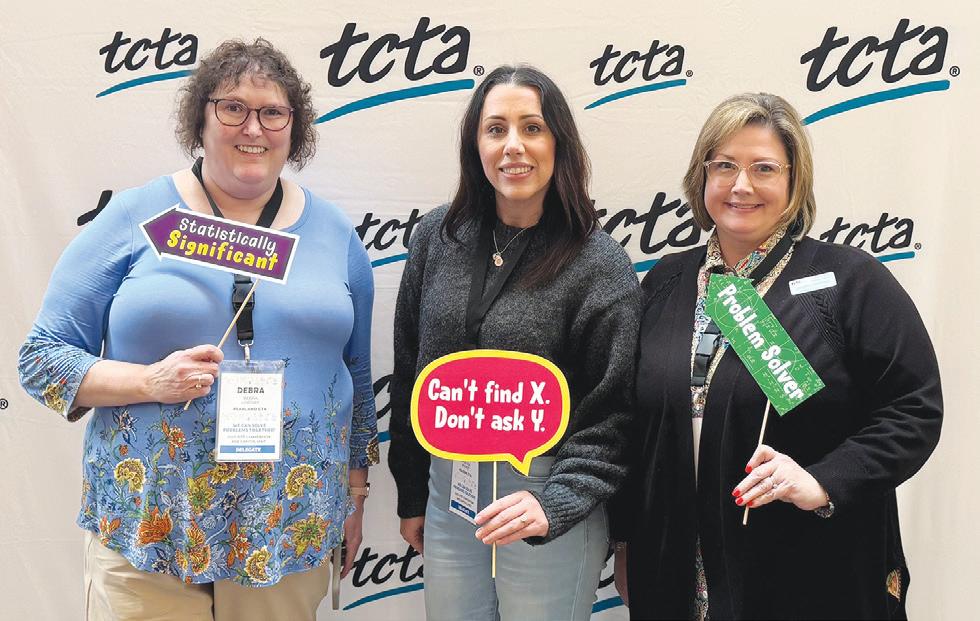


Convention attendees also earned continuing professional education credits during sessions. All TCTA members can log in now at members.tcta.org to watch these three CPE videos and print or save certificates:
• The Role of the General Education Representative on the ARD Committee — You’re More than a Signature, presented by Laura Abbott, Lindy Frazer, Amber Laroche and Kim West of the Region 13 Education Service Center (1.25 credit hours) Note: This video is only available through May 31.
• Legal Q&A Session, presented by TCTA attorneys Julie Leahy, Kaylan Dixon Smith and Derrell Coleman (1 credit hour)
• AI-Powered Pedagogy: Transforming Teaching for Tomorrow, presented by Dr. Bruce Ellis of the Texas Computer Educators Association (1.25 credit hours)
Dr. Ellis presented a companion webinar, Smarter Teaching with AI, during Tuesdays with TCTA on April 15. It is also available to watch on demand for 1 CPE credit hour.
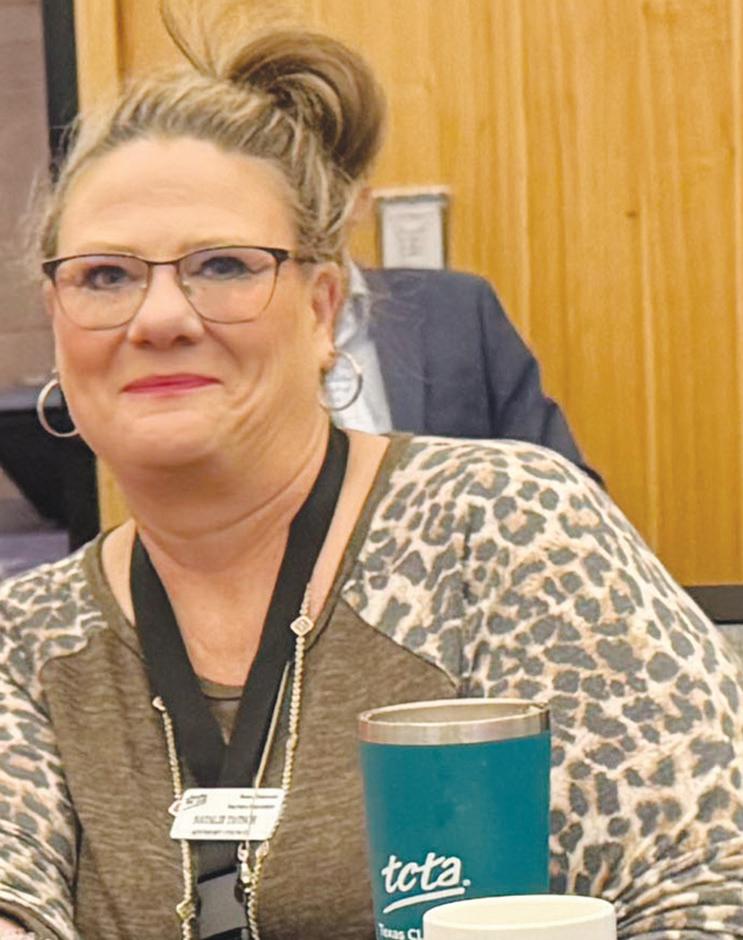

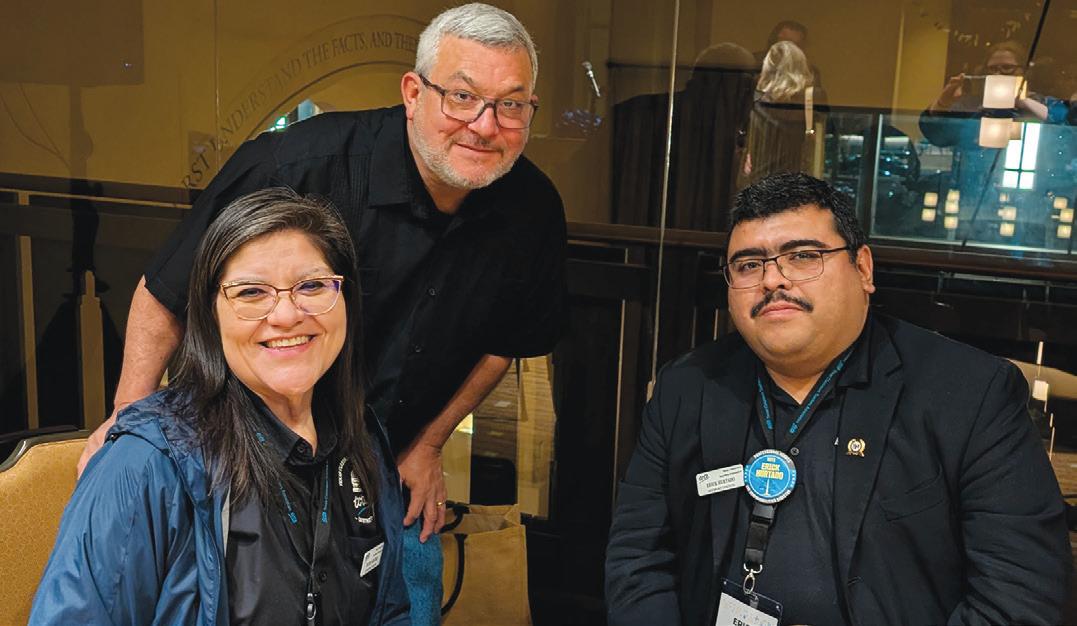
Note: This article is accurate as of press time on May 1. Given the volatile nature of the legislative process, no particular outcomes should be taken for granted. Keep up with the latest information through our daily Capitol Updates (tcta.org/capitol-updates) and our weekly recaps in the eUpdate newsletter (tcta.org/eupdate).
Mid-session is a time for legislators and lobbyists alike to take stock of their progress at the Capitol and craft plans for the end of the session. Legislators hope to shepherd some of their bills through the last steps of the process and get others scheduled for a first hearing, while lobbyists aim to provide suggestions and amendments to improve bills wherever they are in the process. TCTA remains active in helping provide a final polish for significant education bills as they are scheduled for floor debate in both the Texas House and Senate.
A lot can change in the final weeks of the session. With the last day of the 89th legislative session scheduled for June 2, it is less likely that bills just now receiving their first hearing will have enough time to go through the entire legislative process. Key deadlines begin in mid-May, and the last half of the month tends to be a free-for-all of legislative activity.
Most bills take almost the entire session to reach Gov. Greg Abbott’s desk, but as of late April, one of his top priorities already awaits his signature: SB 2.
After the end of the fourth special session in 2023, Abbott vowed revenge against Republicans who voted against school vouchers and stated in no uncertain terms that school choice would be his No. 1 priority in 2025. He succeeded in ousting most Republican voucher opponents during the 2024 election cycle and declared school choice an emergency item at the beginning of the 2025 session, allowing immediate consideration of bills on the topic.
With the Senate tightly under the control of Lt. Gov. Dan Patrick and the House now bolstered with more pro-voucher Republicans, the path was cleared for school vouchers to
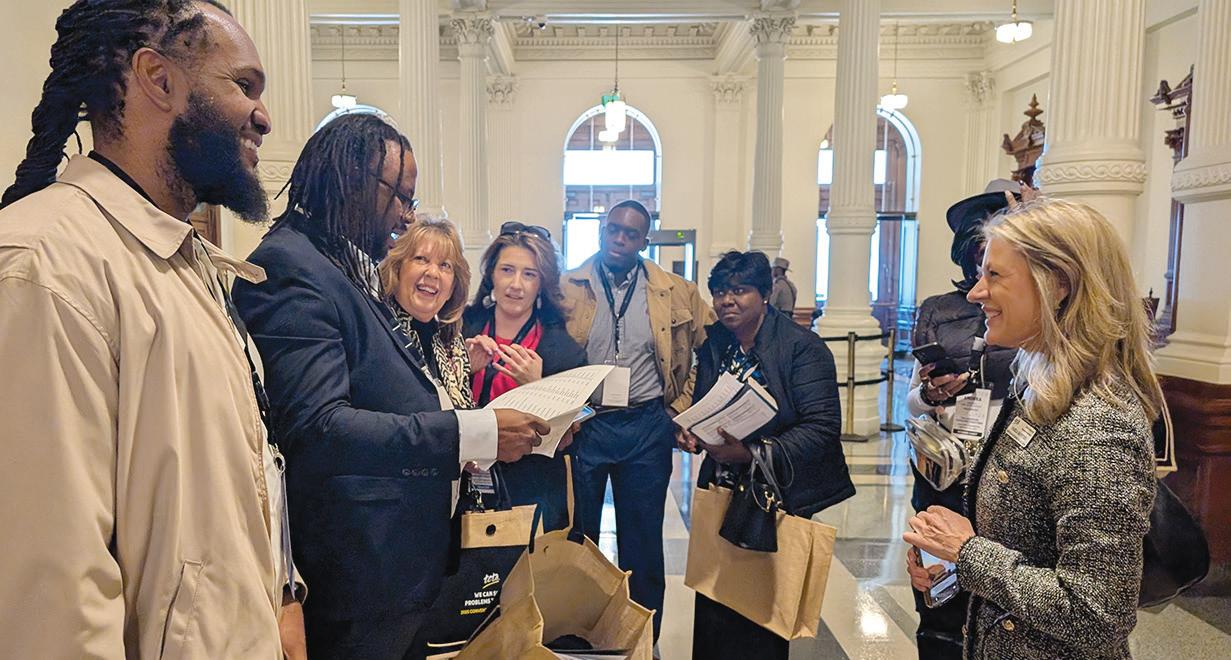
cruise to Abbott’s desk. Two well-attended Save Texas Schools rallies, educator group lobby days and polls showing most Texans do not approve of using public funds for private schools, did little to slow the bill’s momentum.
The Senate wasted no time in passing its voucher bill (SB 2), which provides $10,000 for parents to send their children to private schools, $11,500 for students with disabilities to do the same, and $2,000 for parents to purchase homeschooling supplies and services. For the first biennium, $1 billion will be available for the program, which starts with the 2026-27 school year, but future legislatures could appropriate whatever amount they wish to provide more school vouchers.
SB 2 met more resistance in the House but ultimately passed with support from all but two Republicans, while every Democrat voted against it. The House made a handful of significant changes to the bill, including limiting participation for families making over $160,000 to 20% of the total funds and requiring private schools to be accredited for two years before becoming eligible for the program. The House version gives lower-income families an amount equal to 85% of combined state and local per-student funding (ranging between $10,300 and $10,900), with up to an additional $30,000 for students needing special education services.
Almost all anti-voucher Republicans who survived their 2024 primary election voted for SB 2 on the House floor. One of the staunchest voices against school vouchers, Rep. Drew Darby (R-San Angelo) conceded that the bill “would pass with or without our support” and underlined that he is still “deeply skeptical of [the] program.” He said that by promising his vote, he was able to secure amendments that would reduce the negative impact of a school voucher program on rural communities. Of the Republicans that voted against school vouchers in 2023, only Rep. Gary VanDeaver (R-New Boston) voted the same way this session. (The other Republican voting no was last session’s House Speaker Dade Phelan.)
On April 24, the Senate opted to concur with the House’s changes instead of risking a lengthy conference committee, sending SB 2 directly to Abbott for his signature.
With school vouchers out of the way, the House and Senate now have more bandwidth to focus on other education topics like school finance, student discipline and teacher certification before the session ends.
With no changes to school finance formulas and rampant

While passage of a school finance package this session is likely, its final form has yet to be determined. TCTA continues to push for higher pay for teachers and other educators and support personnel in all districts.
inflation since 2019, teachers have faced stagnant salaries and school districts have been asked to do more for their schools with proportionally fewer resources than in the past. In 2023, the Senate held school finance and teacher salaries hostage, refusing to hear the House’s proposals without the House advancing a voucher bill.
This session, with school vouchers safely across the finish line, the Senate has been more receptive to advancing a meaningful finance package. Early in the session, it passed SB 26, which would provide direct pay raises ranging between $2,500 and $10,000 to teachers depending on their experience and whether they work in a rural or urban school district. The
bill was referred to the House Public Education Committee but has yet to receive a hearing. Notably, the Senate plan does not increase overall school funding via the basic allotment.
Meanwhile, the House passed HB 2, a comprehensive school finance bill that increases the basic allotment from $6,160 to $6,555 per student and automatically adjusts it based on property value growth, increases teacher salaries and requires those increases to prioritize veteran teachers, and increases many other student allotments. Pay raises would vary depending on the district, but preliminary analysis by TCTA suggests that raises could be similar to SB 26 with the
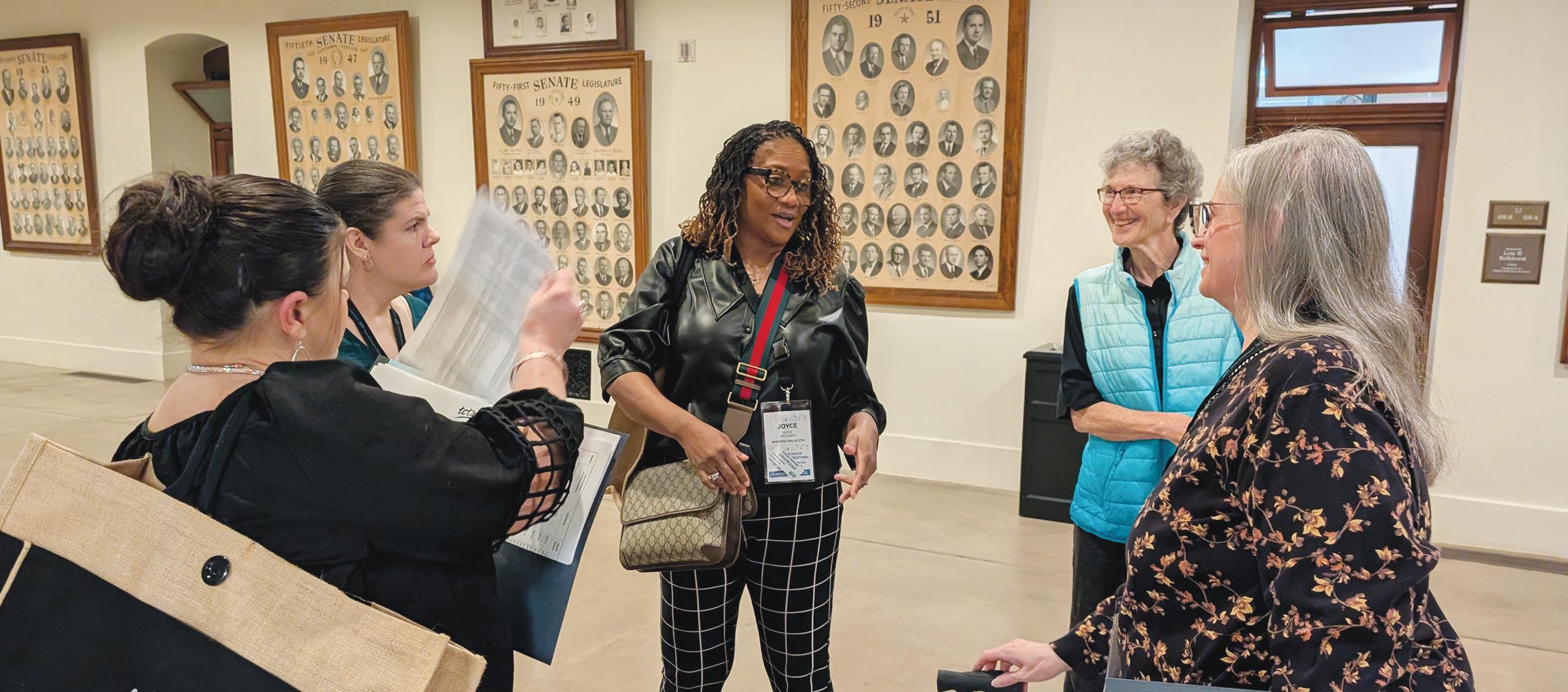
Continued from page 19
potential for even greater raises for veteran teachers in small, rural districts. Unlike SB 26, counselors, librarians and nurses are included in the raises. The Senate will likely debate HB 2 in committee in the coming weeks.
While passage of a school finance package this session is likely, its final form has yet to be determined. TCTA continues to push for higher pay for teachers and other educators and support personnel in all districts.
Student behavior continues to be a significant factor in declining teacher job satisfaction. It also affects the likelihood of individuals entering the profession in the first place. Since the COVID-19 pandemic, many students, particularly younger ones, have exhibited increasingly severe behaviors at school and teachers are expected to handle it all in stride. In one gruesome incident, an administrator in Corsicana lost an eye after a student threw a clothes hanger at her when she entered a classroom to assist a teacher with the unruly student.
While significant changes to student discipline laws have failed in the past, this session a handful of major bills are moving through the legislative process.
Chief among them is HB 6, which would provide more tools for teachers and administrators to address students with significant behavior issues. It allows more lengthy removal from the classroom, mandates that specific plans be made regarding the student’s return, and requires the teacher’s consent before the student rejoins the class. The bill faced resistance in the House due to the perceived increase in “exclusionary discipline” practices but will likely have a smoother journey through the Senate. Lawmakers from both parties acknowledge that the current situation with school discipline is unsustainable and that bold changes are needed to return classroom authority to teachers and administrators.
Sen. Charles Perry (R-Lubbock), a consistent ally on school
discipline, also filed several school discipline bills this session. They passed the Senate without issue but still await a hearing in the House.
TCTA has remained heavily involved in improving student discipline bills in both chambers.
Since the creation of Districts of Innovation in 2015, the number of uncertified teachers in Texas has rapidly increased, and legislators have taken notice this session. Research indicates that uncertified teachers produce lower student outcomes, stay in the profession for a shorter amount of time and require more support from their peers than certified teachers.
The ongoing teacher shortage has forced lawmakers to confront the issue head on. SB 2253 would significantly restrict school districts’ ability to hire uncertified teachers and provide a financial incentive to districts whose uncertified teachers obtain full certification.
Despite requests from TCTA to begin collecting detailed data on uncertified teachers, TEA has declined to do so. Attempts to create a statutory requirement to collect that data have been stymied as well.
However, it is reassuring to see lawmakers turn their focus to the issue this session. TCTA has long emphasized the importance of maintaining the professionalism of teaching, and strong requirements for certification are the first step in ensuring high standards for any profession.
With the session ending June 2, there is still time to contact your state lawmakers to let them know which issues matter the most to you. Whether you leave a brief message with a staffer or have a long conversation with the legislator, your advocacy is a crucial supplement to TCTA’s work at the Capitol as the session winds down.
TCTA is actively involved in many issues not addressed in this article. Members interested in a particular bill or issue are welcome to contact the lobby team at legislation@tcta.org.
Continued from page 9
the status. Due to the complexity of recalculating retroactive and future payments for nearly 3 million people, some payments may be delayed.
By how much may a person’s monthly benefit increase?
The amount monthly benefits may change can vary greatly. Depending on factors such as the type of Social Security benefit received and the amount of the person’s pension, some people’s benefits will increase very little while others may be eligible for over $1,000 more each month. The average increase is estimated to be $360 per month.
How long do I need to work for an employer that pays into Social Security to receive benefits?
To be eligible for Social Security benefits in retirement, you must earn at least 40 “credits” throughout your career. You can earn up to (but no more than) four credits each year. In 2025, you must earn $1,810 to get one Social Security work credit and $7,240 to get the maximum four credits for the year.
Your Social Security FRA is the age at which you’re entitled to 100% of the Social Security benefits you’ve earned.
FRA is 66 for beneficiaries born between 1943 and 1954; it gradually increases to 67 for beneficiaries born in 1960 or later. If you take benefits before FRA, your benefits will be reduced. If you file at 62, for example, the benefits will be as much as 30% lower.
How are my Social Security benefits calculated?
Social Security uses your highest 35 years of earnings, indexed to a national average wage index, to calculate your benefit amount. If you have fewer than 35 years of earnings, each year with no earnings will be entered as zero. You can increase your Social Security benefit at any time (even through part-time work during retirement) by replacing a zero or lowincome year with a higher-income year. There is a maximum Social Security benefit amount you can receive, though it depends on your age when you retire. For someone at full retirement age in 2025, the maximum monthly benefit is $5,018, up from $4,873 in 2024. You can check your Social Security account to see how much you’ll earn when you apply at different times between age 62 and 70.
Do Social Security benefits include an inflationary adjustment?
Unlike your TRS pension, one of the best features of Social Security benefits
is that the federal government adjusts the benefits each year based on inflation. This is called a cost-of-living adjustment and helps your payments keep up with increasing living expenses. In 2025, Social Security beneficiaries receive a 2.5% COLA in their monthly benefits.
Do I pay income tax on my Social Security benefits?
Yes, you may. Most people know that Social Security is funded by a tax on earnings, currently 6.2% for the employee (and 6.2% for the employer). But some retirees don’t realize that you may have to pay income tax on Social Security benefits when it comes time to claim them. Benefits lost their tax-free status in 1984, and the income thresholds for triggering tax on benefits haven’t been increased since then.
Your benefits won’t be taxed if your income is less than $25,000 if you’re single, or $32,000 if you’re married. If you’re single and your income is between $25,000 and $34,000, or married filing jointly with income between $32,000 and $44,000, up to 50% of your Social Security benefits may be taxable. If your provisional income is more than $34,000 on a single return or $44,000 on a joint return, up to 85% of your benefits may be taxable. The Social Security Administration estimates about 40% of beneficiaries pay taxes on their benefits.

Make the most of your membership!
Take advantage of TCTA’s cost-saving programs as you plan your next adventure. Log in at tcta.org/ membership/discount-programs to find deals on Schlitterbahn, Six Flags and other amusement parks, movie tickets, professional sports tickets, zoos, museums, concerts, Broadway shows and more.
Save on car rentals with Alamo, Avis and Budget. Reserve hotel rooms with participating Choice Hotels or Wyndham Hotels & Resorts, which include La Quinta properties. TicketsatWork now offers packages with Carnival cruises along with thousands of shopping deals.
Continued from page 7
Many districts facing budget shortfalls seek to achieve personnel reductions through alternate methods, such as retirement, attrition and intradistrict transfers, before moving forward with nonrenewal or termination.
TCTA encourages school districts to identify cost savings that can be achieved through means that do not affect direct instruction of students. If the elimination of instructional staff becomes unavoidable, the district must meet the legal requirements that form the basis of the RIF process. Teachers and other professional employees hold
an employment contract with the district. Depending on the circumstances, a teacher may have the right to request a hearing regarding the proposed nonrenewal or termination of an employment contract.
Many districts will informally notify a teacher that they have been identified as subject to a RIF and offer that teacher an opportunity to resign prior to the initiation of formal proceedings. TCTA recommends consulting with an attorney before deciding to resign to receive a personalized assessment of whether the district may lawfully move forward with a RIF and what options might be available as an alternative to resignation.
Failure by a school district to observe the legal requirements for a RIF can
form the basis for a successful legal challenge to the district’s proposed action. However, the decision to initiate a legal challenge, even when faced with the prospect of nonrenewal or termination, is not easy. TCTA staff attorneys can evaluate the district’s actions to determine whether there is a legal deficiency in the RIF process and provide advice to current TCTA members that facilitate an informed decision about how to proceed.
This article is for information only and is not a substitute for legal advice. TCTA members with questions about the RIF process, or any other job-related issue, should call the legal department at 888-879-8282 to speak confidentially with a staff attorney.
Continued from page 10
the administration can send a list of discretionary spending rescissions to Congress.
Section 1017 of the Impoundment Control Act (2 U.S.C. § 688) sets out a special set of procedures for weighing resolutions approving presidential requests to rescind funds. These resolutions are considered privileged, requiring a simple majority vote in the Senate. Members of Congress may endorse all, some or none of the president’s proposed rescissions and must act quickly to file a motion to discharge the bill and bring the resolution to the floor for a vote.
As of press time, there is an expectation that the first rescission package by the Trump administration will be dispatched to Congress after the spring recess and will address cuts to public news organizations (NPR, CPB) and for USAID and the Institute of Peace. If successful, an additional rescission package could be considered targeting other agencies.
The loss of discretionary grant programs can remove supports that are vital to schools, teachers and students.
A primary concern of public education stakeholders is that these funds will be transferred to vouchers for parents’ choice to receive private education. The voucher system allows any student, regardless of their family income level or history of attending public schools, to be eligible to use public funding to attend private schools or for home schooling. Allowing states to reduce funding to public schools could limit resources for teachers, mental health services and afterschool programs.
Executive actions to control funding policies by states have been initiated.
On April 3, states received letters from the Education Department requiring them to certify that they are not using DEI policies and ensure they are in compliance with Title VI of the Civil Rights Act to receive federal funding. The letter is cast as a “reminder of legal obligations” when receiving federal funds as it is dependent upon compliance with federal laws. While the department gave states a deadline of April 24 to certify their compliance, some states, like Utah, Colorado, Vermont and Minnesota, refused to sign the certification. Other
states, like Texas, Virginia and Oklahoma, said they would certify compliance. On April 24, a federal judge in Maryland postponed the deadline to comply with the letter as a lawsuit moves through the court system. A federal judge in New Hampshire has blocked Trump administration directives that threatened to cut federal funding for public schools with DEI programs while another case is considered. Both decisions came the day after President Trump signed more executive orders regarding K-12 schools and higher education.
The manner in which the U.S. Department of Education reorganizes and pivots from prior operation creates concerns for schools and administrators.
With the Trump administration’s proposed agenda and legislative efforts in Congress, the K-12 education landscape stands to be altered in the months ahead. But the exact impact on Texas schools remains uncertain. TCTA and our lobbyists in Washington continue to monitor the Education Department and will report on new developments.
This article is provided by Van Scoyoc Associates, TCTA’s retained lobby firm in Washington, D.C.
Continued from page 2
through the process, but there’s usually not much we can do to stop the mayhem.
It can be fun to watch the “show” when the chaos either doesn’t affect your issues or helps strike down a bad bill. But it can be incredibly frustrating when important issues such as school funding and teacher salaries are stymied in the process. We never stop advocating for our members, though, and throughout this last part of the session we will keep working with legislators and their staff members to advance good laws and fix (or defeat) the harmful proposals.
It’s not lost on me that there are elements of outwitting, outplaying and outlasting in classrooms too. (A number of teachers have played “Survivor,”
several of them lasting into the later stages of the game, two even winning. This season’s cast includes a Waco teacher, the aforementioned Mitch, who is a fan favorite.)
Like the most successful “Survivor” contestants, teachers are constantly pivoting to adjust to new circumstances, demonstrating behind-the-scenes leadership and encouragement, finding new ways to achieve their goals, multitasking, and scrambling while maintaining a calm façade. The rules aren’t always fair, it’s grueling, and sometimes you feel like the only person you can rely on is yourself. If you lose one challenge, you come back and try again, and again, and again.
I’d argue that outlasting is ultimately the key to success. Persistence buys you
the time to outwit and outplay, overcome those hurdles, try new strategies, and return, year after year, with renewed determination.
As we wrap up this school year, and this legislative session, it’s easy to get frustrated by the obstacles that are keeping us from reaching our goals.
The machinations in Austin are always interesting, but education policymaking is not a game. The stakes are higher than a $1 million prize, and there’s no “going back to civilization” after it’s over.
A final thought — “Survivor” champions never succeed on their own. Winners always have help. Reach out when you need it, and never forget that we’re on your team, and we’re ready to help you overcome whatever challenges arise.

TCTA now offers 3 ways to get branded clothing and other merchandise.
The TCTA Threads collection at Bonfire includes premium shirt designs available in a variety of colors and sizes, tote bags, a duffel bag and TCTA coffee mugs. Merchandise is printed when you order and shipped directly to you.
Members also can purchase apparel and other items through our Land’s End
storefront. Select your items, add our logo in your choice of colors, and your order will be embroidered and shipped to you by Land’s End.
Need large quantities or custom merchandise for your local affiliate?
Check out the list of available items for purchase or submit a request for a special order and/or custom artwork from TCTA Headquarters. We can help find items to fit every budget.

Texas Classroom Teachers Association
PO Box 1489
Austin, TX 78767-1489
888-879-8282 | tcta.org
Return Service Requested
Starting May 15, log in at members.tcta.org and renew with credit/debit or PayPal or go to tcta.org/renew and fill out the payroll deduction form to ensure your coverage continues when you return to school in August. Invite your colleagues to join for the 2025-26 school year with Take 2, Make $25.* Coverage begins Aug. 1, 2025, or the date they sign up, whichever is later. Send them to tcta.org/join to sign up starting May 15 or call 888-879-8282. *For every two NEW Active-level members you recruit for TCTA, we’ll send you $25! Go to tcta.org/take2 for
